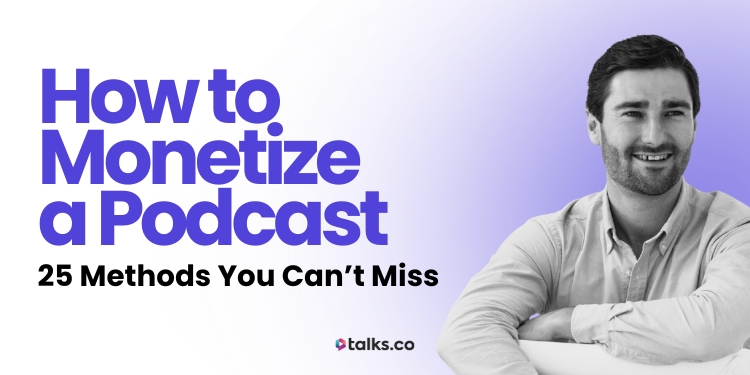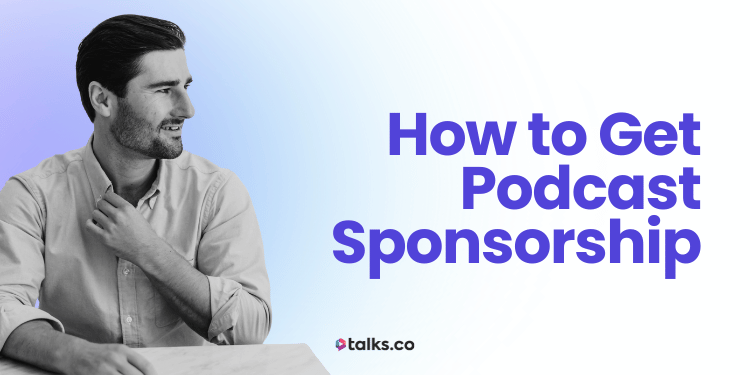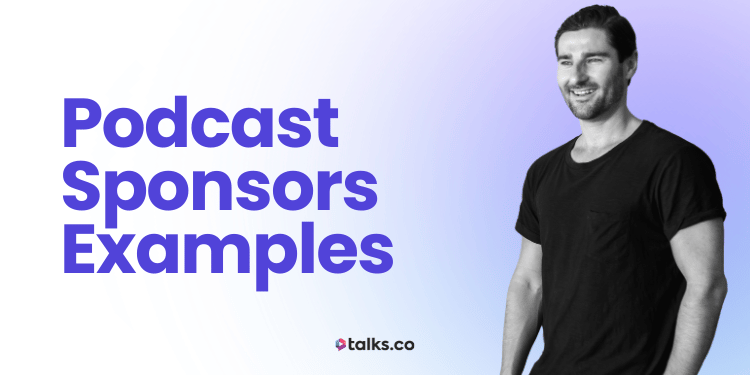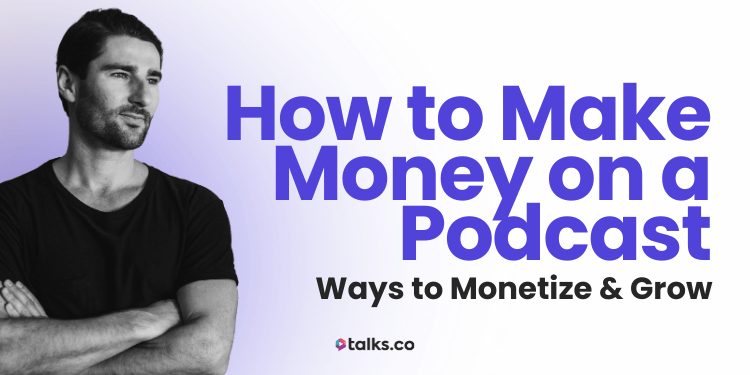Podcasting isn’t just a hobby anymore – it’s a powerful platform that can turn your passion into profit. Whether you’re recording in your home office or a fancy studio, monetizing your podcast is about finding the methods that align with your style, audience, and goals.
In this guide, I’ll take you through 25 ways on how to monetize a podcast, explain the earning potential, and share tips to help you choose the right approach.
How Much Money Can You Make From a Podcast?
The short answer: it depends. Podcasts can generate anywhere from a few hundred dollars a month to six or even seven figures annually. The key is knowing which monetization paths work best for your podcast.
Examples of podcasters and what they earn
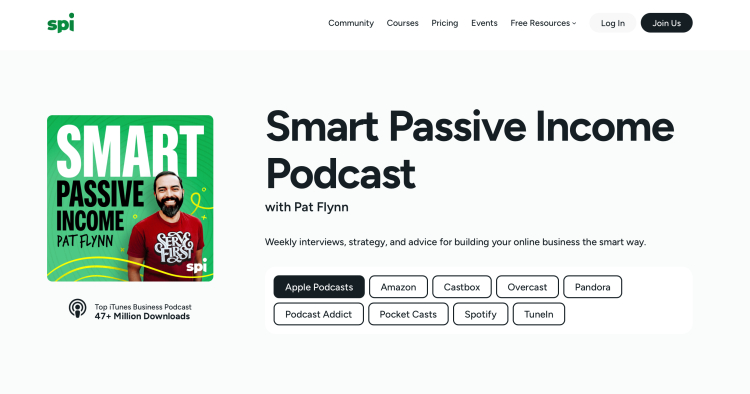
- Joe Rogan (The Joe Rogan Experience): Reportedly earns $30M+ annually through exclusive Spotify licensing and ads.
- Sarah Koenig (Serial): Earns through podcast sponsorship and licensing deals with platforms like HBO.
- Pat Flynn (Smart Passive Income): Makes five to six figures monthly through affiliate marketing and product promotion.
Breaking down podcast revenue streams
Earnings vary based on your audience size, niche, and monetization methods. A podcast with 1,000 loyal listeners can earn more than one with 10,000 casual followers if monetized strategically.
25 Ways to Monetize a Podcast
There are two main approaches to monetizing your podcast: direct methods, where the podcast itself generates revenue, and indirect methods, where the podcast supports your broader business goals.
13 Direct monetization methods
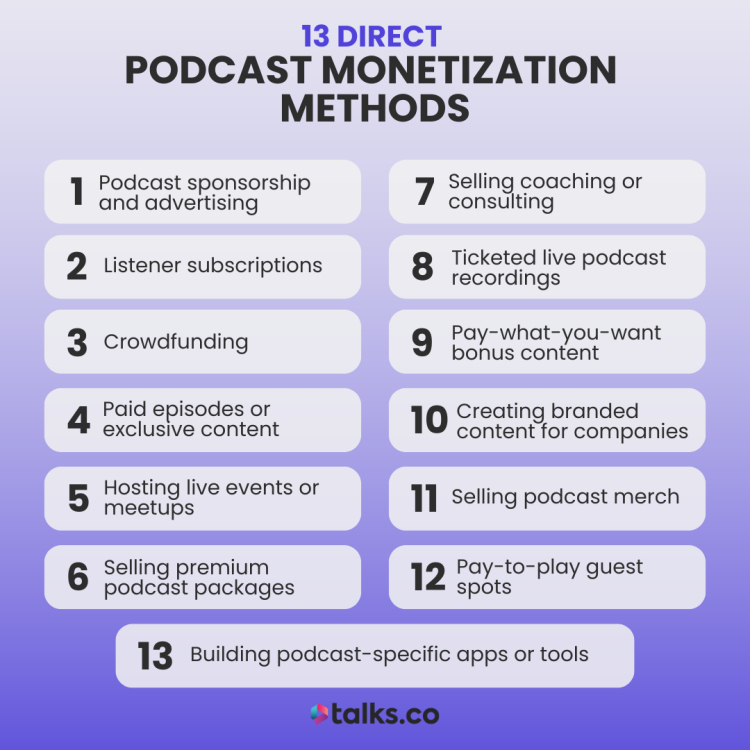
These methods involve generating income straight from your podcast or audience.
1. Podcast sponsorship and advertising
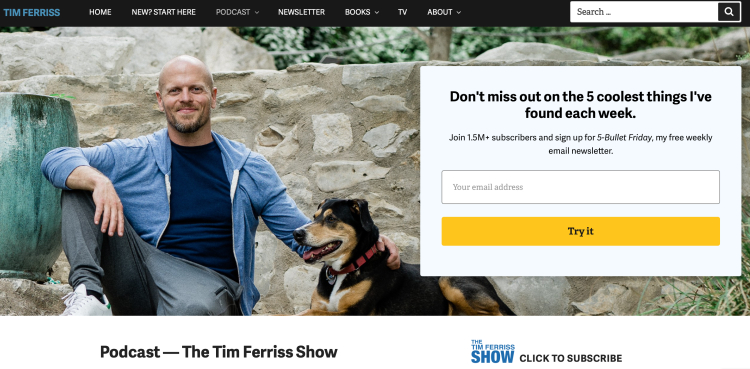
Best for: The big players with a loyal crowd ready to buy what you’re selling.
This is the classic way to monetize your podcast – team up with brands and give them a shout-out during your episode. It’s perfect if you have a solid audience tuning in every week. With an earning potential of around $18 – $50 CPM (cost per thousand listeners), it can add up quickly. The catch? You’ll need some serious listener numbers to get started, and landing those deals takes time.
A podcaster who uses this method is Tim Ferriss. On “The Tim Ferriss Show,” Tim promotes products like athletic gear and supplements through paid partnerships.
2. Listener subscriptions
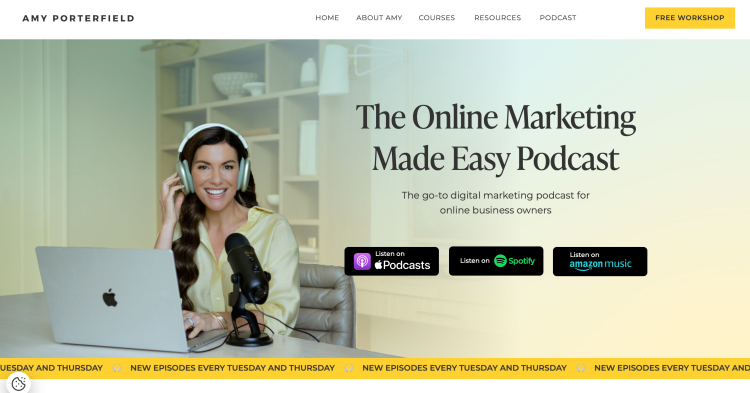
Best for: The superfans who want more from you.
Imagine your biggest fans paying you directly for awesome, exclusive podcast content. Subscriptions are a great way to monetize your podcast if your listeners can’t get enough of your show. Just make sure you’re bringing value, or people might opt out down the line.
Podcasters who use this method include:
- Pat Flynn: On “Smart Passive Income,” Pat integrates affiliate links for tools like Bluehost and Kit, focusing on helping creators and entrepreneurs.
- Amy Porterfield: Her “Online Marketing Made Easy” podcast includes affiliate links for marketing platforms and software tools.
3. Crowdfunding
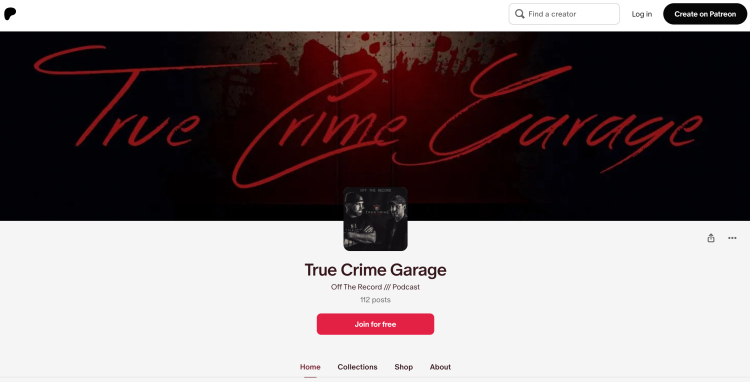
Best for: Podcasters with a close-knit tribe who want to show their support.
Crowdfunding platforms like Patreon or Buy Me a Coffee let your audience chip in to support your podcast. If you’ve built a tight-knit community, this can be the perfect way to get them involved in your podcasting journey. Toss in perks like bonus episodes or a peek behind the curtain, and you’re golden. The trick? Keeping that connection alive and making your supporters feel appreciated.
Podcasters who use this method include:
- True Crime Garage: This podcast uses Patreon to offer bonus episodes and engage its dedicated audience.
- Chapo Trap House: They have been highly successful on Patreon, generating substantial monthly income by providing exclusive content to patrons.
4. Paid episodes or exclusive content
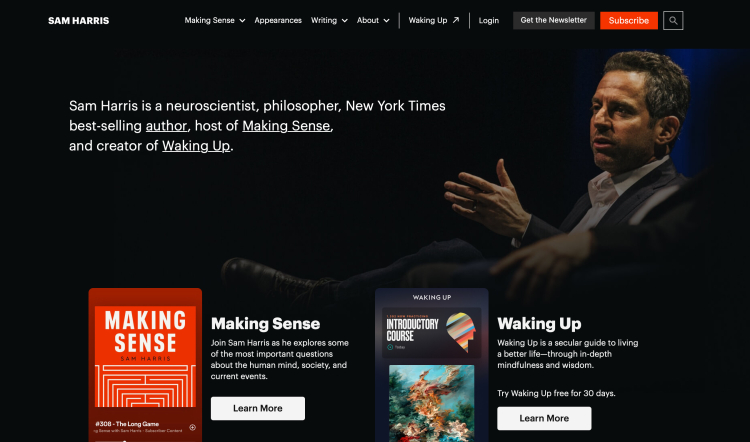
Best for: Content creators with premium material.
Got something extra juicy? Charge for it! Whether it’s deep dives, behind-the-scenes moments, or expert advice, paid content works when it feels worth every penny. It’s a win for you and your most dedicated listeners. Tip: Keep the freebies just as awesome so no one feels left out.
Podcasters who use this method include:
- Sam Harris: His podcast “Making Sense” offers ad-free episodes and exclusive content for subscribers.
- Marc Maron: With “WTF with Marc Maron,” he monetizes through Stitcher Premium for ad-free episodes and bonus content.
5. Hosting live events or meetups
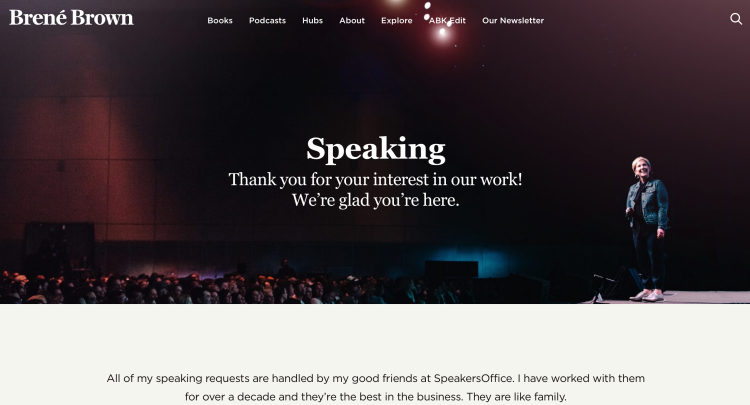
Best for: Podcasters who love connecting offline.
Take your podcast into the real world with live events or meetups. Picture a room full of your listeners, hyped to hang out and connect in person. It’s a great way to build your brand (and your income), but it does take some planning to pull it off.
Podcasters who use this method include:
- Guy Raz: Podcast host of “How I Built This,” Guy frequently participates in live storytelling and speaking engagements at business conferences.
- Brené Brown: Her podcast “Dare to Lead” complements her revenue from keynote speeches and live workshops.
6. Selling premium podcast packages
Best for: Shows offering deeper, exclusive value.
Bundle up your best stuff – like extended episodes, downloadable guides, or exclusive interviews – and sell it as a premium package. This works especially well if your podcast offers advice or actionable tips. It’s scalable, too, so once it’s done, it can keep selling without the extra work.
7. Selling coaching or consulting
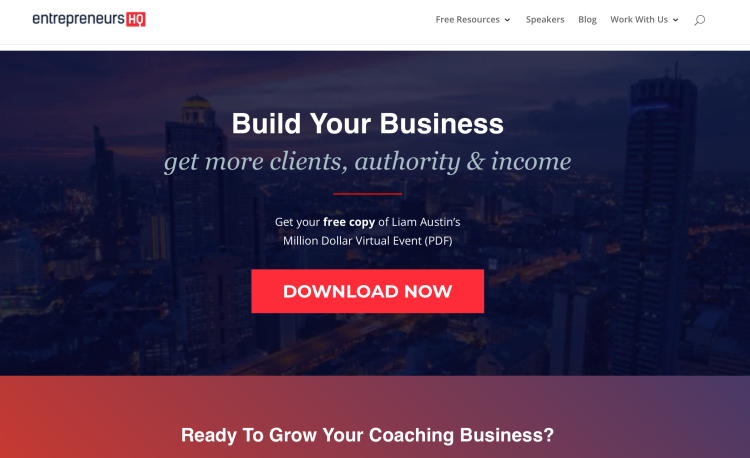
Best for: Podcasters who want to monetize their knowledge through personal guidance.
If you’re the go-to expert in your field, why not offer coaching or consulting? Your audience already trusts you, so it’s a natural fit. It’s a great way to make money, but you’ll need to carve out time for each client.
A great example of this is Entrepreneurs HQ which helps you turn your expertise into a profitable business by guiding you to build authority and launch high-ticket coaching programs. Their strategies are all about connecting with your audience, building trust, and giving them what they need to take the next step with you.
8. Ticketed live podcast recordings
Best for: Podcasters ready to bring their show to life.
Recording your show live in front of an audience? That’s next-level cool. Selling tickets to live tapings is a fun way to bring your community together – and it’s another income stream. Just be ready for the extra effort to pull off a polished live show.
9. Pay-what-you-want bonus content
Best for: Podcasters who want to trust their audience to chip in.
This one’s simple: let your listeners decide how much they want to pay for bonus content. It’s low-pressure for them, and you might be surprised by how generous some fans are. Sure, it’s unpredictable, but it’s a nice way to add value without a big commitment.
10. Creating branded content for companies
Best for: Podcasters who know how to blend marketing with storytelling.
If you’re a seasoned podcaster with killer production skills, you can create content for brands. They pay you, you get creative, and everybody wins. It’s a great way to earn big, but you’ll need to balance their needs with your style.
11. Selling podcast merch
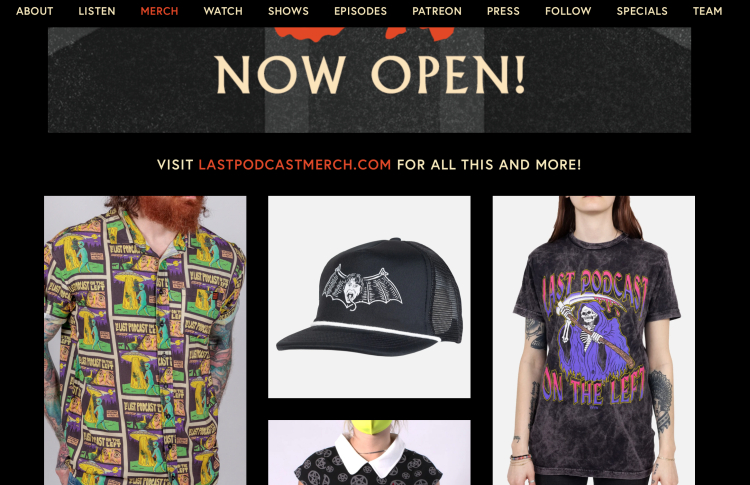
Best for: Creators with a loyal tribe that wants to rock your brand.
Think mugs, T-shirts, or even stickers with your podcast logo or catchphrase. If your listeners love what you do, they’ll love showing it off. It’s fun, it’s personal, and it’s another way to make money while building your brand.
Podcasters who use this method include:
- The Last Podcast on the Left: They sell branded merchandise like apparel and mugs, directly targeting their niche horror and true crime audience.
- Call Her Daddy: With its large fanbase, this podcast sells various merchandise through its platforms.
12. Pay-to-play guest spots
Best for: Shows offering a valuable platform for guests.
When your podcast is established, people might pay for a chance to be featured. It’s straightforward and can bring in good money, especially if your audience aligns with their goals. Just don’t overdo it – you don’t want to lose your podcast’s authenticity.
13. Building podcast-specific apps or tools
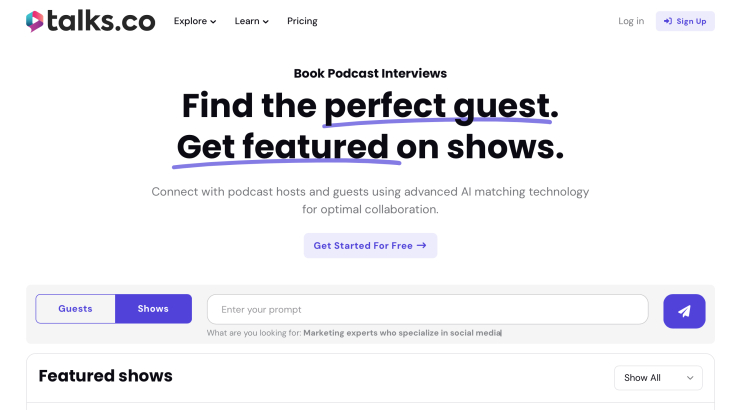
Best for: Tech-savvy podcasters with a niche audience needing something extra.
If you’re tech-savvy or have a niche audience that needs a specific tool, creating a podcast app or product could be your jackpot. It’s a bigger investment up front, but the payoff can be worth it.
Take Talks, for example. It’s a platform where podcasters come together, connect, and even collaborate on ways to monetize their shows. It’s more than just an app – it’s a community where creators can build relationships, share strategies, and discover new ways to boost revenue.
12 Indirect monetization methods
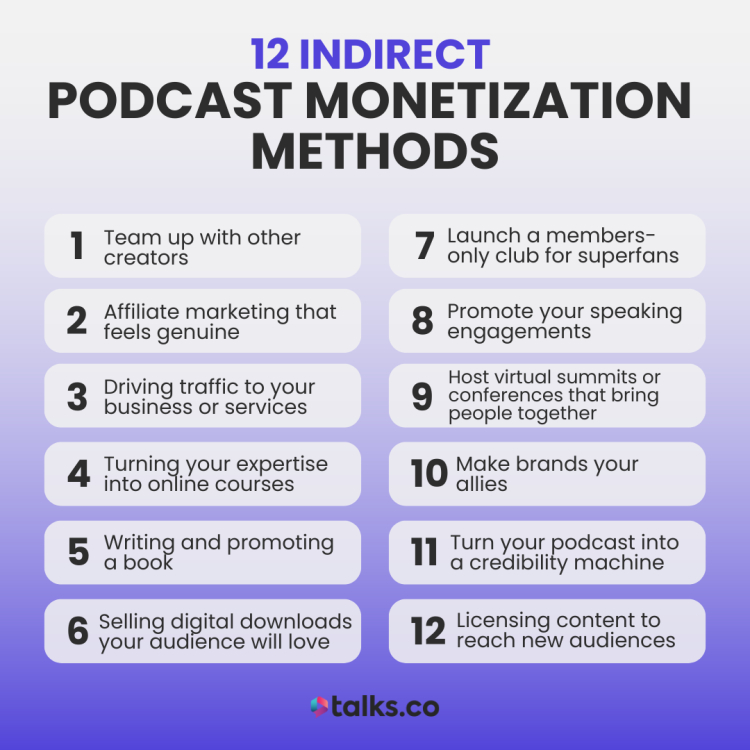
These strategies use your podcast as a launchpad to earn money through related channels.
1. Team up with other creators
Best for: Those who know collaboration = growth.
Think of it as a buddy system for podcasts. Join forces with creators in your space to cross-promote each other’s shows. Got a sports podcast? Collaborate with someone in fitness for a win-win boost. It’s not just about growing numbers – it’s about connecting with audiences that already vibe with your style. Referrals are more likely to buy.
2. Affiliate marketing that feels genuine
Best for: Podcasters who only promote what they truly believe in and can recommend wholeheartedly.
Don’t just hawk random products – share stuff you actually love and use. If your tech podcast lives for the latest gadgets, highlight a must-have tool and drop your affiliate link. When it’s authentic, your audience will trust you, and those commissions can add up without feeling salesy.
3. Driving traffic to your business or services
Best for: Turning listeners into clients.
Your podcast can be a magnet for clients. Picture a therapist hosting a mental health podcast, casually mentioning their private practice. No hard sell – just helpful content with a gentle nudge toward their services. It’s all about showing what you bring to the table.
4. Turning your expertise into online courses
Best for: Educational podcasters with actionable content.
Got invaluable insights? Package them into an online course. If you host a podcast on productivity, create a step-by-step training on conquering time management. Share it with your listeners – they’re already hooked on your advice, so they’ll want to learn more.
Entrepreneurs HQ (EHQ) is a great example of this. They’ve worked with experts to turn their knowledge into programs that not only educate but make a real difference. It’s about showing your audience what’s possible and guiding them through the steps to get there.
5. Writing and promoting a book
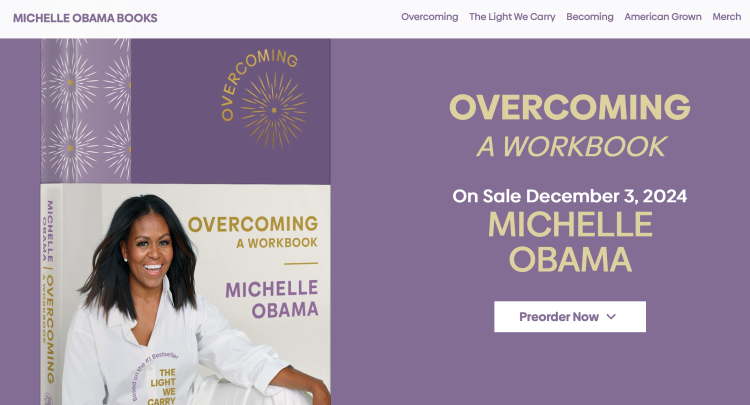
Best for: Podcasters who want to share their story and expertise in print.
Your episodes are basically mini-book chapters waiting to happen. Write that book you’ve been dreaming of and let your podcast audience in on your journey. Share sneak peeks, behind-the-scenes stories, and a preorder link to hype it up. Your book becomes a natural extension of your podcast.
Podcasters who use this method include:
- Michelle Obama: Her podcast promotes her books like “Becoming”, driving book sales while deepening audience engagement.
- Malcolm Gladwell: “Revisionist History” integrates promotions for his books, enhancing both his podcast’s and book’s reach.
6. Selling digital downloads your audience will love
Best for: Podcasters offering useful, downloadable content.
Who doesn’t love a handy download? Create templates, checklists, or guides tailored to your audience. A travel podcaster could offer trip-planning worksheets, while a cooking podcast might sell exclusive recipe bundles. Small effort, big value.
7. Launch a members-only club for superfans
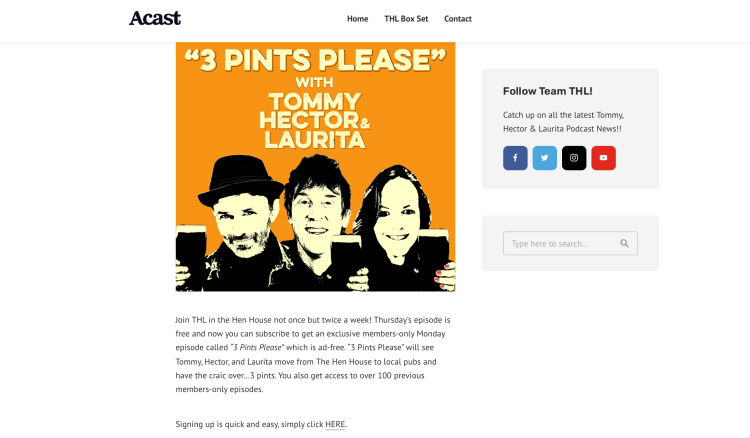
Best for: Building a dedicated, paying community.
Your biggest fans want more of you. Give them VIP access with a membership site offering exclusive content, Q&As, or a private group. Whether it’s bonus episodes or behind-the-scenes tidbits, make your superfans feel like they’re part of the inner circle.
8. Promote your speaking engagements
Best for: Podcasters who speak at events and want to get booked more.
Use your podcasts as your own PR machine. Share clips from past talks or drop hints about upcoming events. As a motivational speaker, you could let your audience in on what you’ll be covering, creating buzz and packing the room with listeners who already love your vibe.
9. Host virtual summits or conferences that bring people together
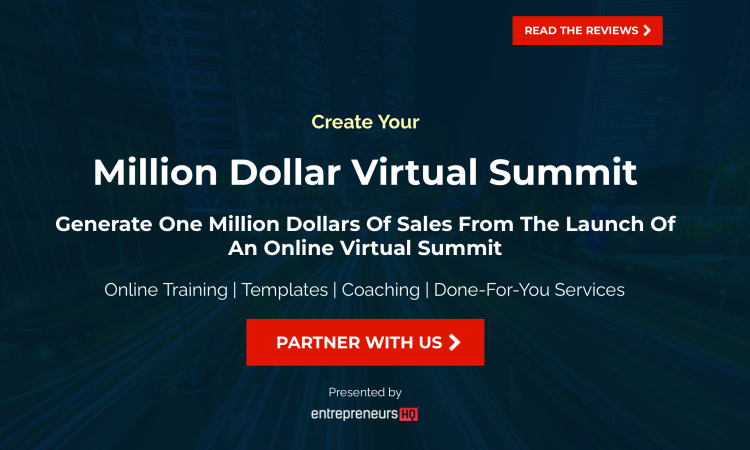
Best for: Podcasters with the network and expertise to run major online events.
Why not throw a virtual party? Bring experts and your audience together in a virtual summit. If your podcast is about entrepreneurship, host a “Side Hustle Success” event. Charge for tickets or offer premiums for those who want extra perks.
10. Make brands your allies
Best for: Podcasters ready to partner up with brands in a way that doesn’t feel forced.
You don’t need ads to work with brands. Partner up on creative projects or special episodes. A sustainable living podcast might team up with an eco-friendly brand for a limited series. It’s about collaborating in a way that feels right for you and your audience.
11. Turn your podcast into a credibility machine
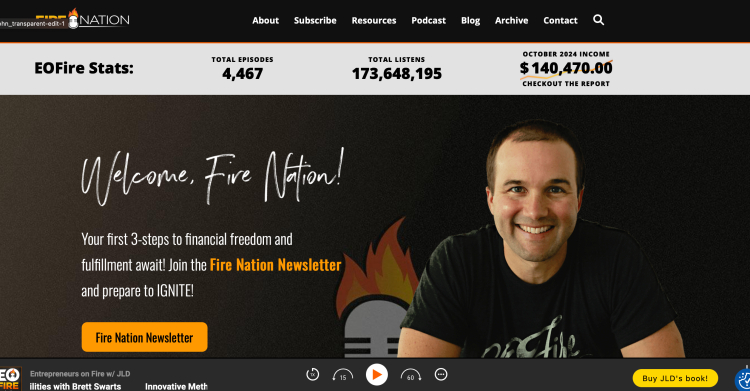
Best for: Podcasters looking to use their content as authority-building collateral.
When people see you as an expert, opportunities come knocking. Your podcast could land you consulting gigs without you even pitching. Share your knowledge, build trust, and let your audience spread the word about how legit you are.
John Lee Dumas uses his “Entrepreneurs on Fire” podcast to complement his consulting services for entrepreneurs.
12. Licensing your content and reaching new audiences
Best for: Podcasters with evergreen content ready to make money across different platforms.
Your podcast could be exactly what schools, brands, or media outlets need. A history podcaster could license podcast episodes for educational use, or a parenting podcast might see clips used in a commercial. It’s a smart way to keep your voice out there – and get paid.
How to Select the Best Podcast Monetization Method
When choosing how to monetize a podcast, you need to align it with your goals, audience, and content style. Here’s what to look for:
1. Audience engagement and size
Do you have a loyal, niche audience? Go for selling your services, like coaching or affiliate marketing. Bigger audiences? Sponsorships or ads may be the best revenue stream. Highly engaged listeners are more likely to buy from you, while a larger crowd might attract better sponsorship deals.
2. Type of content
Is your content educational, product-based, or service-oriented? For educational content, affiliate marketing fits well. If you’re a coach or course creator, sell your own offerings. Choose a monetization method that matches what your show is all about.
3. Your expertise and offering
Do you have a coaching service or product? Use your podcast to promote it. If you’re an expert, listeners will trust your advice and are more likely to purchase. Monetizing through your own expertise feels natural and builds trust.
4. Speed and effort
Want quick returns? Try affiliate marketing or sponsorship. Ready to invest time for long-term goals? You can build your own services or courses. Some methods bring in money faster but need less effort. Others require setup but pay off over time.
5. Income potential and scalability
High-ticket services or products are great for big paydays but need time to set up. Affiliate marketing scales with minimal effort but offers steady, lower returns. Choose based on how much time and effort you’re willing to invest for the income you want.
6. Personal brand and authenticity
Pick methods that fit with your brand. If you’re not into ads or sponsorships, focus on your own products or services. Your listeners will appreciate the authenticity. Staying true to your brand keeps your audience engaged and trusting.
Should You Try to Make Money Podcasting?
Podcasting is a powerful tool for building authority, sharing knowledge, and connecting with your audience. But can it also be a serious income stream? Here’s what you need to know before you start monetizing your podcast.
Is your podcast ready for monetization?
Before you start chasing revenue, ask yourself: have you built a loyal audience? Monetization doesn’t work if you don’t have a solid listener base. Focus on providing high-quality, engaging content first. It’s easier to convert listeners into paying customers once you’ve proven the value of your podcast. Consistency, trust, and a clear niche will set you up for success in the long term.
Balancing creativity and monetization goals
One of the toughest parts of monetizing a podcast is finding the right balance between staying creative and pursuing revenue. Your passion for creating content should always come first.
However, as you start earning, consider how to integrate monetization in a way that feels natural. Whether it’s sponsorships, paid content, or merchandise, make sure your creativity isn’t stifled by the pressure to make money. Keep your audience’s interest in mind and aim for revenue opportunities that align with your values and the tone of your podcast.
When podcasting is a passion vs. a profit-focused project
Many podcasters begin as a passion project, sharing what they love without the intention of making money. If your primary goal is still about creating content for the love of it, then monetization may not be necessary right away. However, when your podcast starts gaining traction, it’s important to reassess.
Transitioning from a passion project to a business mindset requires a shift in how you approach content creation and audience interaction. If you’re looking for profit, you’ll need to treat your podcast like a business, which means planning for income streams while maintaining the authenticity that made your podcast popular in the first place.
When to Start Monetizing Your Podcast
Knowing when to start monetizing can be tricky. If you rush it, you risk alienating your audience before they’ve had the chance to truly connect with your content. Timing is everything.
Signs your audience is ready to support you
Your audience will give you signals when they’re ready to support you. Look for engagement:
- Are your listeners sharing your episodes?
- Are they interacting on social media?
- Are they asking you how they can help?
If they’re actively involved, that’s a good sign that they’re ready to support you financially. Don’t wait for every single listener to be on board, but if you’re getting consistent feedback from a group of engaged listeners, you’re probably on the right track.
Why monetizing too early can backfire
Monetizing too early can hurt your relationship with your listeners. If you don’t have enough content or a strong audience yet, pushing for monetization may come across as too sales-focused. It can also reduce your credibility if it feels like your primary goal is profit, not delivering value.
Focus on building a genuine connection with your listeners first. When you’re confident that your podcast has hit its stride, that’s when you can start thinking about monetization.
Small steps to ease into monetization
There’s no need to dive into monetization all at once. Take small steps to ease into it, such as introducing a Patreon or offering bonus content for a fee. You could also consider sponsored ads when your download numbers justify it. Start by testing different monetization methods, paying attention to how your audience reacts, and adjusting as needed.
The key is to grow naturally while keeping your audience’s experience in mind – your listeners will appreciate the organic approach and your podcast will be stronger for it.
How Many Listeners Do You Need to Make Money?
Here’s the thing – it’s not just about how many listeners you have, it’s about how many of them are really into what you’re saying. The more niche your audience, the more they’ll trust you and the more willing they’ll be to support you financially.
A podcast that serves a specific interest can build a strong connection with its listeners, even if the audience is smaller. For example, a podcast for ultra-enthusiastic soccer fans or health-conscious parents can monetize well, even with fewer listeners, because their audience is deeply engaged.
Realistic goals for different podcast sizes
The reality is, podcasting is a marathon, not a sprint. Your revenue expectations will vary depending on the size of your podcast. Here’s a quick breakdown:
- Small podcasts (under 1,000 listeners per episode): You might not be raking in big sponsorship deals just yet, but you can still monetize. Think about offering premium content, exclusive access (like Patreon), or small-scale sponsorships. Start small and focus on building that loyal base.
- Medium podcasts (1,000 – 10,000 listeners per episode): At this size, you’re in a great position to attract smaller sponsors or affiliate deals. You might also start looking into creating and selling your own products, such as online courses, coaching sessions, or services.
- Large podcasts (over 10,000 listeners per episode): Here, you can begin looking at serious sponsorship deals, high-ticket products, or even creating a paid membership community. The larger your podcast, the more options you have for monetization.
Remember, each podcast is different, so don’t feel pressured to hit certain numbers right away. Set achievable milestones based on your current reach and focus on growing steadily over time.
How to grow your audience to increase earnings

If you’re looking to boost your listener count, the key is consistent, high-quality content and strategic marketing. Here are a few tips:
- Leverage social media: Promote your podcast on all your platforms. Engaging with your followers and sharing snippets of your episodes on Instagram, Facebook, and X can help you reach new listeners. Use hashtags and collaborate with other creators in your niche to expand your niche.
- Get on other podcasts: Cross-promotion is a powerful tool. Guest appearances on other podcasts or having guests on your show can introduce you to new audiences. It’s a simple, yet effective way to expand your listener base.
- Ask for reviews: Encourage your listeners to leave positive reviews on platforms like Apple Podcasts. The more positive the reviews you have, the more likely new listeners are to check you out.
- Focus on SEO: Use keywords in your episode titles, descriptions, and show notes to help people find your podcast. The more discoverable you are, the more likely you’ll attract new listeners.
How to Make Money With a Podcast
Podcasting can be more than just a creative outlet; it can become a serious source of income. Here’s the good news – turning your podcast into a full-time business is totally possible, and it doesn’t require a massive audience to get started. Whether you’re in health, fitness, life coaching, or any other niche, there are real ways to monetize and turn your passion into profit.
Maximize your existing content
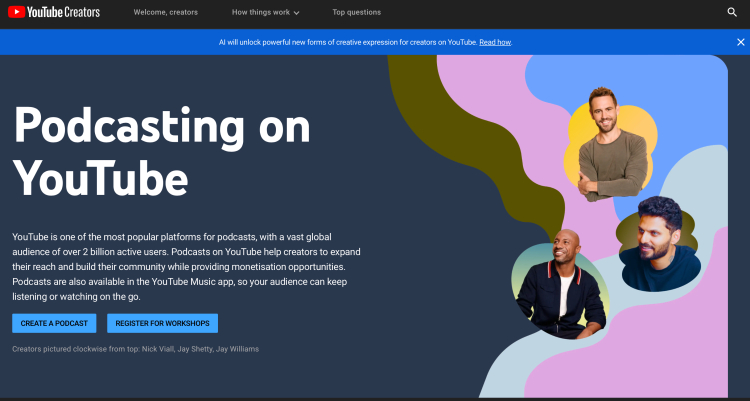
You’ve already created great content, so why not make the most of it? Repurposing your podcast into multiple formats like blog posts, YouTube videos, social media snippets, and even email newsletters can help reach a wider audience. This cross-promotion keeps your message consistent across platforms and draws more people to your podcast.
Your existing content is a goldmine – turn it into extra income by packing it in different ways that appeal to your audience.
Factors That Impact How Much Your Podcast Makes
To make serious money from your podcast, several factors play a part. Here’s a quick rundown:
- Listener count: More listeners = more potential for sponsorships, ads, and paid subscriptions.
- Engagement rate: High engagement means more listeners taking action – whether that’s subscribing, leaving reviews, or supporting your content financially.
- Niche and content type: The more specific your podcast topic, the more likely you are to attract sponsors looking for a niche audience. Think health coaching, business strategies, or specific fitness topics. These can bring in higher sponsorship rates.
- Sponsorships and ads: A big chunk of revenue for many podcasts comes from sponsoring deals and ad placement. The size and engagement of your audience play a big role in attracting these deals.
- Monetization strategies: How you choose to monetize matters. Ad revenue, listener donations, paid episodes, or selling related products/services can all contribute to your earnings. A diversified income stream is often the most successful.
- Consistency and episode frequency: Regular uploads help maintain and grow your audience. Consistency is key when building a dedicated listener base that comes back for each new episode.
- Marketing reach: The more you promote your podcast across social media, email lists, and through collaborations, the more you can grow your audience and potential income. Organic growth works, but putting effort into promotion can make a huge difference.
How to Increase Your Podcast Earnings
If you’re ready to take your podcast to the next level and start seeing more income, here are some strategies that can help:
Upselling premium content to your audience
- Offer bonus episodes: Give listeners exclusive, behind-the-scenes content or deep dives that they can access for a fee.
- Create a membership program: Offer a subscription-based model where listeners get access to premium perks, such as early access, exclusive content, or live Q&A sessions.
- Merchandising: Leverage your podcast’s brand by offering limited-edition merchandise to your loyal audience.
Using analytics to improve monetization strategies
- Track audience demographics: Understand who your audience is and tailor your content (and ads) to them. The more targeted your content, the higher the chance of attracting premium advertisers.
- Monitor listen-through rates: Identify the episodes that perform the best and double down on that content. More engagement means more opportunities for sponsorships.
- Adjust based on feedback: Use listener reviews and engagement data to refine your content and make sure you’re creating what your audience wants.
Diversifying income streams for steady growth
- Sponsorship deals: Partner with brands that align with your content to run ads or sponsored episodes.
- Affiliate marketing: Promote products that fit your niche and earn a commission when your listeners make a purchase.
- Crowdfunding: Platforms like Patreon allow your fans to support your podcasts directly, giving them special access to content in return for their support.
How to Start Monetizing Your Podcast
Ready to start making money with your podcast? Here’s how to get going without breaking the bank or making rookie mistakes:
Free and low-cost tools to get started
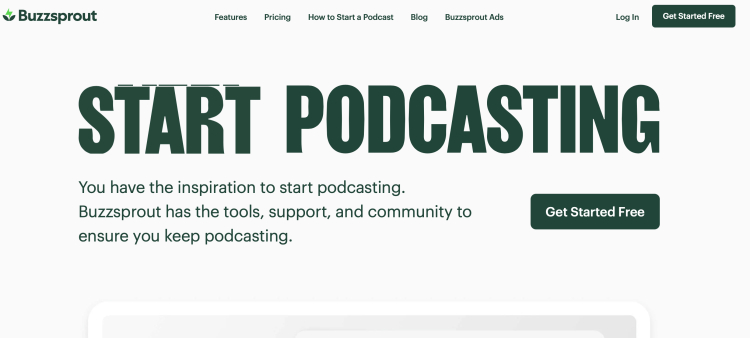
- Talks: Talks.co is a platform designed to connect podcasters, helping you network, collaborate, and unlock new monetization opportunities. It’s a great way to grow your audience and explore different revenue streams.
- Buzzsprout: Affordable hosting with great features like detailed analytics and easy podcast distribution.
- Canva: Create custom podcast artwork and promotional images for free or at a low cost.
- Audacity: Free, open-source audio editing software. It’s perfect for editing episodes with no cost involved.
- Zencastr: If you want to record remote interviews, Zencastr offers a free plan with great audio quality.
Ready to Turn Your Podcast into a Money-Making Machine?
So, you want to know how to monetize a podcast? It’s not some secret formula – it’s about consistency, smart moves, and putting in the work upfront. When you start with a clear plan, focus on building an audience, and diversify your income streams, you’re already ahead of the game.
Remember, the most successful podcasters didn’t get there overnight. They figured out what their audience wanted, offered value, and found ways to make their content work for them. Whether you’re just starting or looking to level up your podcast, it all comes down to taking the right steps.
Ready to turn your podcast into a profitable powerhouse? Don’t wait.
Sign up for free at Talks.co today and start connecting with a community of like-minded creators. It’s the perfect place to share tips, collaborate, and learn from others who are already making strides in the podcasting world.
